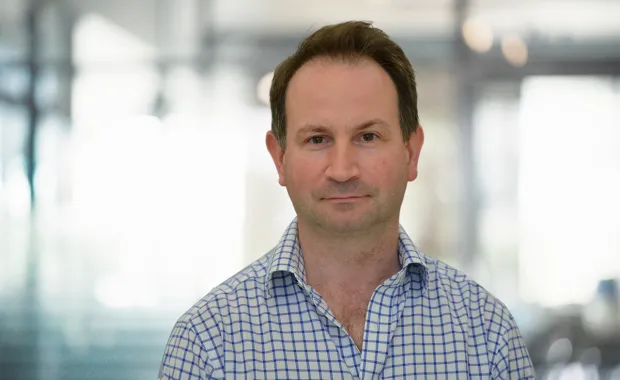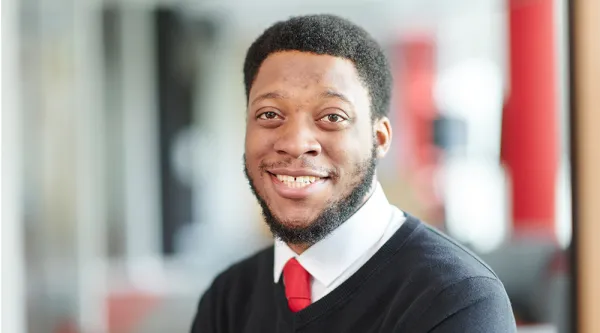After 25 years as a Royal Navy Warfare Officer, John Firth transitioned into his second career at CGI, bringing his leadership and cyber security expertise to a government project. At CGI, John has taken ownership of his role, leading a team of skilled security professionals and driven creative and innovative approaches to ensure the highest quality work. Supported by CGI’s inclusive and collaborative environment, he has thrived in a space that encourages continuous growth and creativity.
October 2024
Can you share a bit about your background and how you initially joined CGI?
Prior to joining CGI, I spent 25 years as a Warfare Officer in the Royal Navy. In the final few years of my career in the Navy, I moved towards cyber security operations and planning. I then reached a natural point where I decided it was right time to leave the Navy and pursue my second career in the civilian workplace.
I think that leaving the Armed Forces is very different from leaving other jobs. From submitting your notice to retire, you then have a year to prepare to for life in the civilian world. It also means that when you submit your notice, you are doing it without the certainty of firm job offer. The resettlement process is aimed at preparing you for the civilian workplace, providing additional training with high quality courses, and supporting you in finding a job. I was also struck by the kindness and support provided by other Service Leavers who had gone through the same process previously and how willing they were to give up their time to help me. It was through one of these connections that I was introduced to CGI.
I joined CGI immediately on leaving the Navy and was warmly welcomed to the company. I was immediately aware of the available support from other members around me and they were keen to ensure that I settled in well. As part of the induction and onboarding process into my second ever employment, I supported a number of internal tasks which were really helpful introducing me to the way the company operated its business, before joining my current project.
Could you describe your current role and responsibilities within the company?
My current role is the Security Lead with a Government client. I lead a team of ten cyber security members who work on different security aspects of the programme. I have overall responsibility for security and ensuring the quality of security work is delivered to the programme at the correct standard whilst allowing, not hindering, the production process. This involves frequent engagement with several “customers”, in particular identifying potential problems at an early stage so that they can be addressed before they become serious. I am also responsible for assigning the correct members to project teams and tasks and ensuring the best engagement of a highly skilled team. One of the most exciting parts of the job is looking after the team in the workplace and finding ways to support them and keep them motivated.
How have the skills from your earlier roles translated to your current role?
Without a doubt my time with the Royal Navy equipped me with many skills which have translated over to this civilian role. Most significant of these are the “soft” leadership skills. I am extremely privileged to work with a team, who in many cases, have a depth of knowledge and skill level far beyond my own but the togetherness to ensure we excel in our delivery to the programme is exceptional. Understanding and recognising this is fundamental. My previous experiences have also equipped me to deal with conflict resolution and stakeholder management. The roles have also taught me about making difficult decisions, but that I also have the support back into the business when I need it, and the need to provide honest feedback to those whom those decisions affect.
What values do you think CGI embodies, and how have these influenced your work?
CGI promotes a culture of unconditional inclusivity, focusing on the talents and skills that can be brought by each CGI member as an. This includes embracing diversity of thought and culture, which allows for a creative approach to tackling problems. It also promotes personal growth through the culture of a safe workplace. This gives me the confidence to call out where behaviours need improving when I see them, including sensitive issues with customers, in the knowledge that I will be supported by CGI. This in turn gives the team confidence that they will have a genuinely safe environment in which to work.
What are you most looking forward to when it comes to your future at CGI?
I am looking forward to further developing my IT skills and knowledge, and leading and working with other CGI teams in the future. I am also looking forward to supporting and developing other members of CGI, through helping attract new talent or helping them settle in when they join the company. Having experienced such support and generosity as I was leaving the Navy and joining CGI, I am keen to pass on my experience and support to others. As a senior member of my group, I also look forward to supporting the development of our junior members through their own CGI journey.
Find out more about cyber careers at CGI and see whether we have any opportunities for you.





